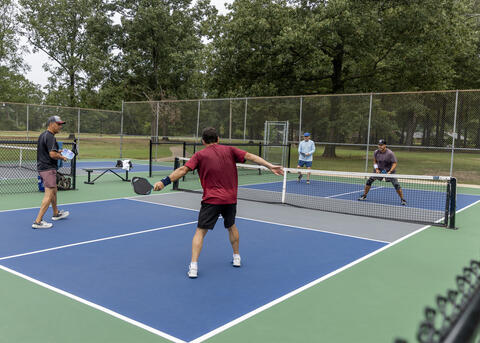When intense summer heat sets in, adults who like to work and play outdoors should take precautions to keep safe.
Starkville pickleball player Liz Stringer did that this summer when temperatures approached triple digits and heat indexes rose even higher.
“I drink a lot of water with added electrolytes throughout the day,” Stringer said. “I sweat a lot, so I need to replenish and keep hydrated. I drink at least three 32-ounce bottles each day.”
She plays pickleball with a group of adults most mornings. One concession the group made to the heat was to begin play 30 minutes earlier each day.
“I usually play for two to four hours,” she said. “If I play again in the evenings, I don’t play for more than two hours. By then, I’m pretty tired.”
She said she used to run, and that plus her continued high level of physical activity has kept her body acclimated to the heat.
Mary Nelson Robertson, health specialist with the Mississippi State University Extension Service, said the danger of getting too hot in the summer is very real.
“Heat-related illness is not just uncomfortable; it can be life threatening, and it does not take record-breaking temperatures for it to happen,” Robertson said.
Heat becomes risky around 90 degrees, but humidity can make a lower temperature more dangerous.
The National Weather Service defines heat index as “what the temperature feels like to the human body when relative humidity is combined with the air temperature.” Perspiration is the body’s cooling mechanism, but when the relative humidity is high, the rate of sweat evaporation from the body decreases. Weather apps on smartphones provide the heat index.
Symptoms of a person getting too hot or dehydrated increase in severity. They start with heavy sweating, fatigue, thirst, dizziness or muscle cramps and move on to nausea, headache, rapid heartbeat or irritability. Severe signs of heat stroke may include confusion, no sweating, red or hot skin, fainting and vomiting.
“If these symptoms appear, stop the activity immediately and move to a cooler place,” Robertson said. “Drink cool water or electrolyte drinks. Remove excess clothing and cool the body with wet cloth or fans. If symptoms do not improve within 30 minutes, or if severe signs appear, seek help immediately.”
For those who plan to spend extended time exerting themselves outdoors, hydration is key. Fuel the body with balanced meals, as dehydration worsens with poor nutrition. Then build up heat tolerance over time.
“For example, if you plan to start playing pickleball, build up your heat tolerance by gradually increasing your exposure to the heat over 1 to 2 weeks prior,” she said. “Start with short, low-intensity workouts, such as taking a walk or gardening, and progressively increase your duration and intensity as your body adapts.”
She said athletes of all ages should listen to their body and adjust accordingly.
“Wear lightweight, breathable clothing and a hat, and schedule breaks in the shade or indoors,” she said. “If possible, try to time your activity to when you are not in the heat during the hottest time of day.”
Robertson said age affects a body’s ability to regulate heat. Children overheat faster than adults and may not recognize the signs of overheating. Older adults may have a reduced sweat response and be on medications that affect hydration. Teens and young adults may push through discomfort, which increases their risk of overheating.
Qula Madkin, an Extension instructor and registered dietitian nutritionist, said summer heat should not stop outdoor activity if done safely.
“As a mom of four, I know that summer is a wonderful time to explore, play outside and create memories,” Madkin said. “Summertime for my family means lots of sunshine and plenty of outdoor fun, but playing smart in the sun is my priority.”
Apply sunscreen every two hours for healthier skin in the long term. Sunscreen is necessary even on cloudy days, as ultraviolet rays can penetrate through clouds and still cause damage.
In addition to drinking lots of water, snacking on fruits like watermelon, oranges and grapes that contain high amounts of water are useful hydration options.
“These fruits are easy to pack, fun to take with you and great for on-the-go energy,” she said.
While unrelated to the heat, using bug spray is usually necessary when outdoors in the South in the summertime.
“Mosquitoes and other bugs are outside, too, and having lots of fun, so keep bug bites at bay with bug spray,” Madkin said. “DEET-based products are safe and effective at repelling mosquitoes, ticks and other insects when used as directed.
“Newer chemical repellants, such as picaridin, or herbal-based products, such as oil of lemon eucalyptus, are proven effective against mosquitoes, but they don’t last as long compared to DEET-based products,” she said. “Whatever repellant you use, be sure to apply it after applying sunscreen.”
Images
Contacts
-
 Extension Instructor
Extension Instructor- Central MS Research & Ext Center

